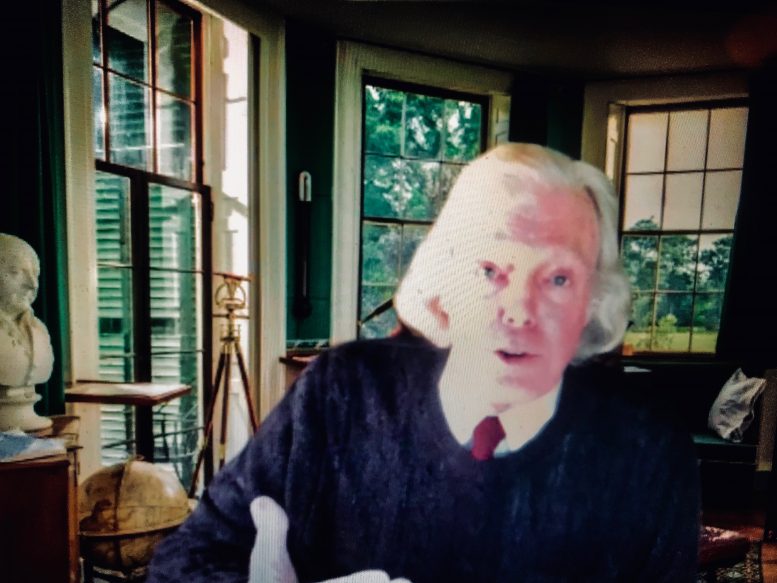By DAVID DUPONT
BG Independent News
In his book “Stamped from the Beginning: The Definitive History of Racist Ideas in America,” author Ibram Kendi casts Thomas Jefferson in harsh light.
In the chapter devoted to Jefferson, Kendi brings the Founding Father to task for his hypocritical views on the question of slavery.
On one hand he wrote eloquently about the equality of men, and seemed at times to include captive Africans in this, yet his comfortable life that enabled his high-minded pursuits was built on the institution of slavery.
Whie he condemned sexual relations between the races, he himself fathered five children by Sally Hemmings, an enslaved woman.
Perrysburg Coalition for Inclusion and Social Justice’s virtual book discussion group has been reading and talking about “Stamped from the Beginning.”
Earlier this month, Jefferson was the focus, and the coalition arranged to bring in maybe the closest you can get to having the Virginian himself on hand.
Since 1984, Bill Barker, an actor and history teacher, has portrayed Jefferson in the shrines of the American Revolution starting first at Independence Hall in Philadelphia, then for more than 25 years at Colonial Williamsburg, and since 2019 at Jefferson’s home at Monticello.
He was first approached to portray Jefferson because someone saw a resemblance between him and the Founding Father. At the time, Barker said, he did have red hair and was “gangly.”
But the job requires more than looks. His job, he told the audience at the Perrysburg event, is to breathe life into history by “portraying that individual and holding fast to what they wrote and what they were heard to have said, knowing as precisely as possible what they were doing at a particular time, where and with whom.” And then answering queries about how that relates to contemporary times.
Asked what Jefferson, with his undoubtedly racist beliefs had to offer today, Barker responded that Jefferson was devoted to free inquiry and would have supported the kind of discussion and questioning that was occurring during the session.
“I don’t want to come across as defending Jefferson,” he said. “But I hope I can come across with some historical facts that are very relevant to associate with him. We should still be arguing this, debating this and should still be appalled by it as some were in Jefferson’s time.”
Jefferson and the large family he was responsible for were dependent on slavery. He found himself in debt because he was away so often in public service and because he made bad loans. Yet he said “I will not sell my people, I will not sell my family.”
At a time when the entire nation was protecting the institution of slavery, he did take actions opposing to slavery.
In court, he did argue in a case representing an enslaved person using natural law that all people were born free, only to have the judge gavel down his argument.
In the House of Burgesses he proposed ending the importation of enslaved people to Virginia.
Yet, he could not free himself from dependence on the forced labor of others.
His “Notes on the State of Virginia,” written in response to questions posed by the French government, reflects both his enlightened thoughts, including the right to question the very existence of the deity, as well as his most abhorrent thoughts on race.
These are related, in that they show his mind at work. That makes them no less offensive, Barker said. Jefferson himself had doubts about the book and refused when asked to allow it to be used as a school text.
Barker’s appearance and the following small group discussions on Jefferson were the second in a five-part monthly series hosted by the coalition. Each takes up one of the chapters in Kendi’s “Stamped.” The first in January covered Puritan theologian Cotton Mather, next month’s will look at abolitionist William Lloyd Garrison. After that will come W.E.B. DuBois followed by Angela Davis.
The series, said Jolie Sheffer, a BGSU professor and one of the founders of the coalition, has proved popular. So popular it is fully subscribed.
The coalition was founded a couple years ago after racist incidents in Perrysburg. One involved a house being scrawled with racist graffiti after being shown to a Black family.
The coalition has hosted forums and other events. A year ago they presented a panel discussion on the issues posed by the film “Just Mercy.”
They hit upon Kendi’s book, she said, as a way to go beyond initial conversations about racism.
“He’s not just talking about racism, he’s also showing the antiracism efforts in our history,” Sheffer said. “Our history is a braided history. We need to understand what efforts have been truly anti-racist and which ones may have seemed to be progressive, but on further inspection still had certain racist ideas at their roots.”
In its historical approach, “Stamped from the Beginning” shows how so many institutions –government, religious, social, and education – “are all built on maintaining the status quo and that status quo is quite often founded on racial inequalities.”
Each session begins with a talk by a scholar, then participants are divided into small discussion groups. (The limits posed by the numbers in small groups is why participation must be limited).
“Those are a place to reflect on how this history lives in us today,” Sheffer said, “and how we see some of the ideas from Cotton Mather’s time are still shaping the lives we lead in 2021.”

